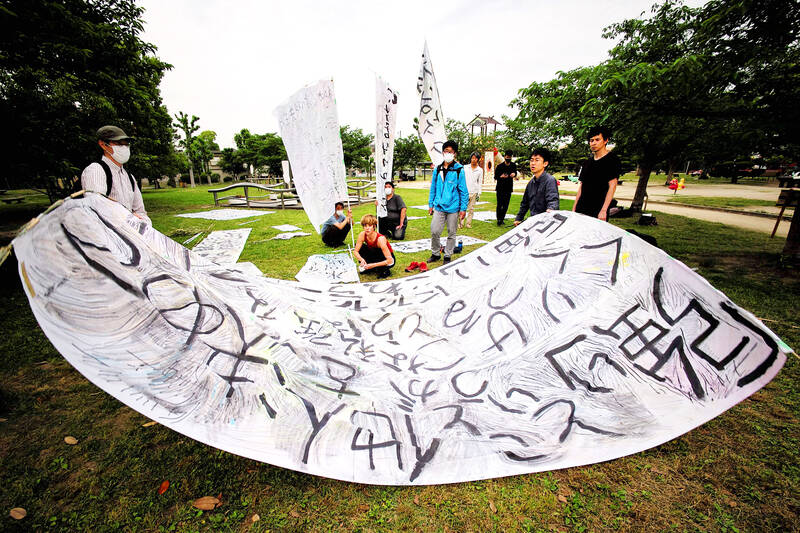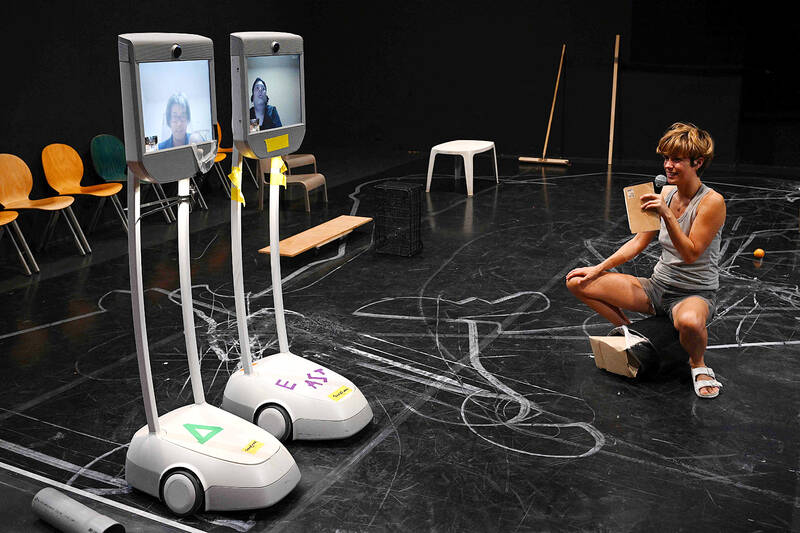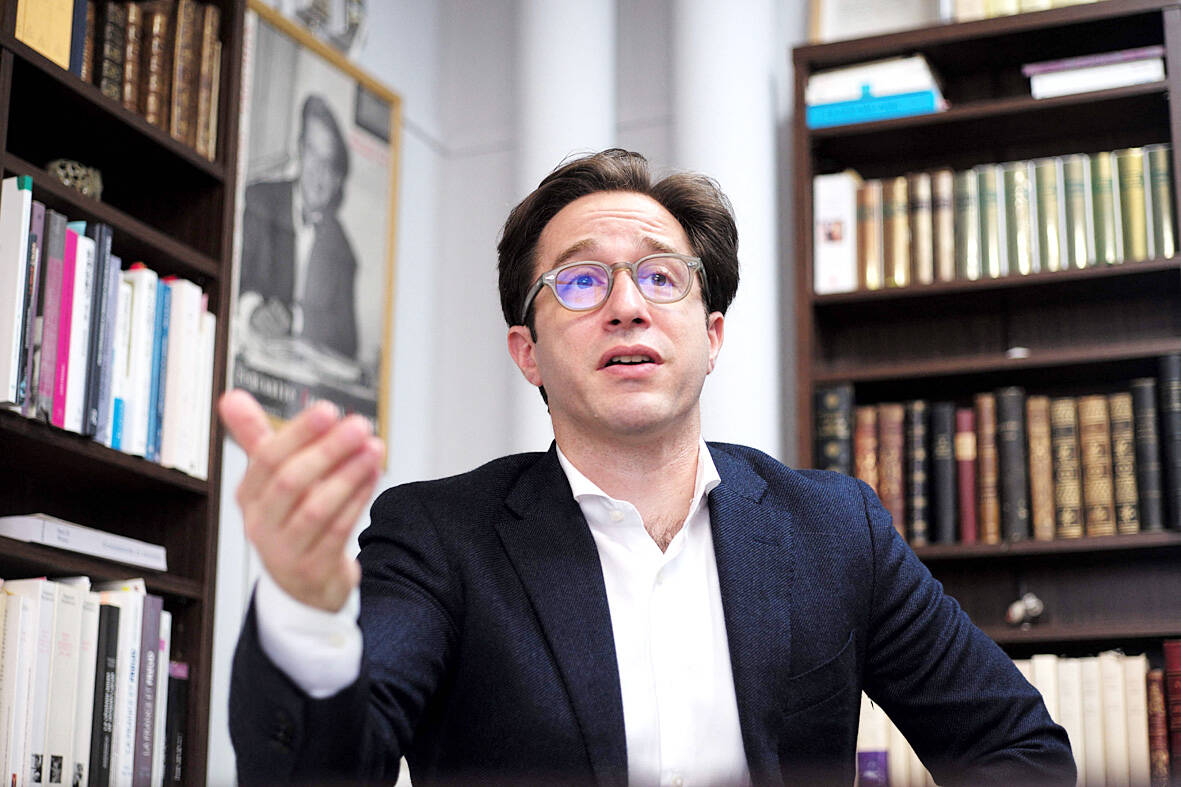Disillusioned by work and tired of life, Seiji Yoshida withdrew from the world for seven years, but now he’s taking part in a play about the experiences of Japan’s hikikomori, or social recluses.
The 42-year-old spent most of his thirties shut inside his home.
“I was going through the motions of life, but lying to myself. Apart from work, I had nothing. I’d just had enough,” he said at a workshop for the international production.

Photo: AFP
Yoshida was among more than a million Japanese aged 15 to 64 who lead highly reclusive lives, withdrawing from all social contact for at least six months, according to a 2020 government estimate.
Through an experimental theater project, two French artists are hoping to offer hikikomori — or “shut-ins” as they are often referred to in English — a chance to express themselves and regain self-confidence.
Their play Hiku — to be shown next year in France, Belgium and elsewhere in Europe — aims to give hikikomori a platform for self-expression, while respecting their desire for isolation.

Photo: AFP
It features robots controlled by participants at home in Japan and voice recordings of conversations held through bedroom doors.
It also includes footage from small but noisy street demonstrations staged by hikikomori who are taking steps towards leaving their confinement — but who feel oppressed by Japan’s demanding work culture.
“We don’t want to be forced to work! Stop oppressing us!” participants chanted at one demonstration filmed in the city of Takatsuki in western Japan.

Photo: AFP
Yoshida, who took part in the protest, said he was “very proud” to be part of the theater production.
‘ROBOT AVATARS’
The producers are working in Takatsuki with a local organization, New Start Kansai, which provides support and company for hikikomori to help them gradually readjust to life in society.
“It’s a social problem... but society has made (hikikomori) believe that the problem comes from them,” said Atsutoshi Takahashi, a mediator at the association.
Nicolas Tajan, a psychoanalyst and associate professor at Kyoto University, said hikikomori often faced difficulties in childhood.
In Japan, “childhood and adolescent psychological difficulties are not addressed and not treated,” he said. “That means in adulthood it can crystallize into a type of social withdrawal.”
As adults, they face additional problems as they “are looked down on because they don’t work,” he added, noting that “work is really a very important part of Japanese identity.”
Around a dozen recovering hikikomori are taking part in the project.
Some will control robots from 10,000km away during the play, painting messages on the floor and talking to spectators through microphones.
The robots are “a sort of avatar” to explore “being present and absent at the same time, a recurring theme for hikikomori,” said co-director Eric Minh Cuong Castaing, a visual artist and dancer.
He hopes the production will help audiences reflect on their own lives, arguing that while hikikomori are sometimes regarded as weak, their actions represent a kind of resistance to being “a soldier in a suit and tie.”
‘PREJUDICES’
When the French artists began researching the project in Japan, they took time to build connections with the isolated people introduced to them by New Start Kansai.
“It was a big challenge for some of them to let us into their homes and speak to us,” said co-director Anne-Sophie Turion, who will perform in the play as a narrator.
She said being strangers from another country may have made things easier, “because the usual prejudices weren’t there.”
“We found people who we felt closer to than we ever could have imagined.”
Recovery can be difficult for hikikomori, who fear once they have withdrawn from society, they won’t be allowed back in, psychoanalyst Tajan said.
“This reinforces their avoidant behavior.”
But art can help reclusive individuals “reconnect with creativity” and envisage “another world” beyond psychiatric treatment or re-entering employment, he said.

Growing up in a rural, religious community in western Canada, Kyle McCarthy loved hockey, but once he came out at 19, he quit, convinced being openly gay and an active player was untenable. So the 32-year-old says he is “very surprised” by the runaway success of Heated Rivalry, a Canadian-made series about the romance between two closeted gay players in a sport that has historically made gay men feel unwelcome. Ben Baby, the 43-year-old commissioner of the Toronto Gay Hockey Association (TGHA), calls the success of the show — which has catapulted its young lead actors to stardom -- “shocking,” and says

The 2018 nine-in-one local elections were a wild ride that no one saw coming. Entering that year, the Chinese Nationalist Party (KMT) was demoralized and in disarray — and fearing an existential crisis. By the end of the year, the party was riding high and swept most of the country in a landslide, including toppling the Democratic Progressive Party (DPP) in their Kaohsiung stronghold. Could something like that happen again on the DPP side in this year’s nine-in-one elections? The short answer is not exactly; the conditions were very specific. However, it does illustrate how swiftly every assumption early in an

Inside an ordinary-looking townhouse on a narrow road in central Kaohsiung, Tsai A-li (蔡阿李) raised her three children alone for 15 years. As far as the children knew, their father was away working in the US. They were kept in the dark for as long as possible by their mother, for the truth was perhaps too sad and unjust for their young minds to bear. The family home of White Terror victim Ko Chi-hua (柯旗化) is now open to the public. Admission is free and it is just a short walk from the Kaohsiung train station. Walk two blocks south along Jhongshan

Francis William White, an Englishman who late in the 1860s served as Commissioner of the Imperial Customs Service in Tainan, published the tale of a jaunt he took one winter in 1868: A visit to the interior of south Formosa (1870). White’s journey took him into the mountains, where he mused on the difficult terrain and the ease with which his little group could be ambushed in the crags and dense vegetation. At one point he stays at the house of a local near a stream on the border of indigenous territory: “Their matchlocks, which were kept in excellent order,